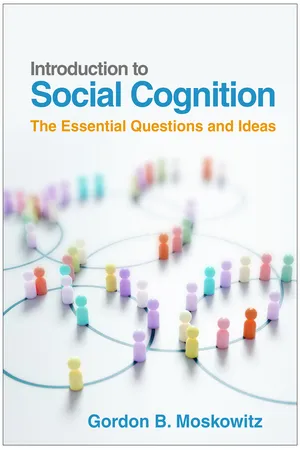
- 557 pages
- English
- ePUB (mobile friendly)
- Available on iOS & Android
eBook - ePub
About this book
Why are first impressions so powerful? How do we “know” what others are like when we cannot read their minds? How can scientists measure biases that people do not want to admit--or do not know they have? This engaging text delves into social cognition by exploring major questions in the field through an everyday lens. Students are introduced to core concepts and processes pertaining to how people come to know themselves and understand the behavior of others. Classic and contemporary findings and experimental methods are explained. The text connects the research to pressing contemporary problems--the roots of political polarization, why even rational people fall prey to misinformation, and the best ways to reduce prejudice. Boxed definitions of key terms are included throughout.
Frequently asked questions
Yes, you can cancel anytime from the Subscription tab in your account settings on the Perlego website. Your subscription will stay active until the end of your current billing period. Learn how to cancel your subscription.
No, books cannot be downloaded as external files, such as PDFs, for use outside of Perlego. However, you can download books within the Perlego app for offline reading on mobile or tablet. Learn more here.
Perlego offers two plans: Essential and Complete
- Essential is ideal for learners and professionals who enjoy exploring a wide range of subjects. Access the Essential Library with 800,000+ trusted titles and best-sellers across business, personal growth, and the humanities. Includes unlimited reading time and Standard Read Aloud voice.
- Complete: Perfect for advanced learners and researchers needing full, unrestricted access. Unlock 1.4M+ books across hundreds of subjects, including academic and specialized titles. The Complete Plan also includes advanced features like Premium Read Aloud and Research Assistant.
We are an online textbook subscription service, where you can get access to an entire online library for less than the price of a single book per month. With over 1 million books across 1000+ topics, we’ve got you covered! Learn more here.
Look out for the read-aloud symbol on your next book to see if you can listen to it. The read-aloud tool reads text aloud for you, highlighting the text as it is being read. You can pause it, speed it up and slow it down. Learn more here.
Yes! You can use the Perlego app on both iOS or Android devices to read anytime, anywhere — even offline. Perfect for commutes or when you’re on the go.
Please note we cannot support devices running on iOS 13 and Android 7 or earlier. Learn more about using the app.
Please note we cannot support devices running on iOS 13 and Android 7 or earlier. Learn more about using the app.
Yes, you can access Introduction to Social Cognition by Gordon B. Moskowitz in PDF and/or ePUB format, as well as other popular books in Psychology & Psychiatry & Mental Health. We have over one million books available in our catalogue for you to explore.
Information
Table of contents
- Cover
- Title Page
- Copyright
- Dedication
- About the Author
- Preface
- Note to Students
- Acknowledgments
- Contents
- Chapter 1. Thinking Is for Action (Purposeful), So We Make Meaning from Chaos
- Chapter 2. We Create Internal Mental Representations of External Reality
- Chapter 3. Self-Report Is Unreliable Because Cognition Is Often Automatic
- Chapter 4. We Can Know What People Think Even When They Don’t Know
- Chapter 5. First Impressions Are “Sticky” and Difficult to Update
- Chapter 6. First Impressions Can Be Implicit, Making Them Even More Persistent
- Chapter 7. We Follow Rules When Asking “Why?,” Acting Like Intuitive Scientists
- Chapter 8. Biases Are Common and Arise from Normal Cognitive Processes
- Chapter 9. Biases Are Common and Are Often Motivational in Nature
- Chapter 10. Beyond the Information Given: Responding Guided by Priming
- Chapter 11. Prejudice and Stereotyping
- Chapter 12. Cognitive Processing Is Flexible, and Processing Types Dissociable
- Chapter 13. The Updating of Impressions Is Promoted by Diagnostic Stimuli and One’s Goals
- References
- Author Index
- Subject Index
- About Guilford Press
- Discover Related Guilford Books